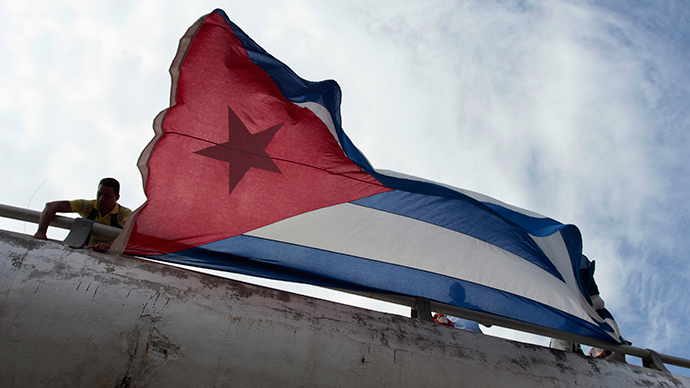‘Cuban people are very well-informed about US attempts to undermine their government’

The Cubans are not open to manipulation which makes it more difficult for aid providers to provide aid, and for recipients to know what they are getting is true help, activist from the Answer Coalition Eugene Puryear told RT.
A new leaked report says that the US secretly sent young Latinos to Cuba to trigger political unrest. The "travelers" project was launched in Cuba in October 2009 by the US Agency for International Development (USAID). Another US attempt to spy on the neighboring country was from an HIV-prevention workshop.
RT:What do you make of such tactics - recruiting people under the guise of innocent assistance, while undermining the nation?
Eugene Puryear: Well, I think it is absolutely deplorable on multiple levels. First and foremost, from the point of view of the regime change level. The State Department is constantly saying about the civil society promotion, but the reality is that the Cuban government is in fact supported by the Cuban people and supporting these regime change programs are vastly misguided. Secondly, sending people in there, essentially viewing them as expendable, telling them to go there with almost no training and really just hoping to get something out of it, but not caring whether they are in prison or anything of that nature. Third, equally if perhaps not most importantly of all of these things, is that now all sorts of people, not just aid workers but tourists, and everybody knows that tourism is one of the main industries in Cuba, say “I don’t want to go there because I don’t want them to treat me like perhaps I’m a spy or something of that nature.” So it harms the nation of Cuba and the people of Cuba who depend on this industry to bring in foreign currency to support their economy, to allow them to have things like universal healthcare that is celebrated around the world as one of the greatest. So I think it is deplorable at multiple levels.
RT:How does this kind of recruiting actually work?
EP: It is difficult to say 100 percent, but we do know at least from some documents and from an individual who was a double agent inside of Venezuela and Cuba who was recruited and was released a bit earlier this year, that they recruit people from any number of ways, especially young people from college campuses, different sort of travel programs, more or less everywhere when they feel that there will be some conglomeration of students who for whatever reason could be there from a country where there is already political turmoil, people who may have some personal predisposition against Cuba, but certainly it happens on all levels. We also see moving away from young people, in particular we know as an absolute fact that the US government has approached many of the Cuban doctors that serve abroad in Venezuela, Brazil and other places, and attempted to woo them, we see it in the sports world. So really anyone who perhaps they view has any potential or predisposition to this or some sort of leverage against them. From these young people and from what has been reported that many of them were recruited as students, and I think this is the way these things often happen, when people who are “Oh, I’m interested being involved in some NGO projects” and you sign up with an NGO that looks great, then it turns out that it is a USAID program that asks you to run intelligence operations.
RT:Latin American leaders, who oppose the US, have frequently blamed Washington for plotting revolutions in their countries. With Cuba now, are we seeing the White House using an undercover plot plan?
EP: It certainly is, because ultimately it makes every single person even we who have entirely positive and altruistic motives, it makes it much more difficult for them to do their work from the point of view of not only the government, but also the attitude of the people. Quite frankly, the Cuban people are very well-informed of this sort of things; they know that since 1960 there has been any number of US efforts on the Cuban government, from assassinations to invasions to the promotion of terrorism inside of Miami. People who are coming in and offering aid, people of Cuba are not open to this form of manipulation in a large-scale way. And perhaps they will be also more wary about NGOs coming in, not themselves wanting to be manipulated by a foreign power. So it makes it much more difficult for aid providers to provide the aid and it makes it much more difficult for those who are receiving the aid to really know what they are getting is a true person-to-person contact that is for the good of the people as supposed, not something they are being used as pawns. I think many people in Cuba and around the world are not interested in it.
The statements, views and opinions expressed in this column are solely those of the author and do not necessarily represent those of RT.
The statements, views and opinions expressed in this column are solely those of the author and do not necessarily represent those of RT.












